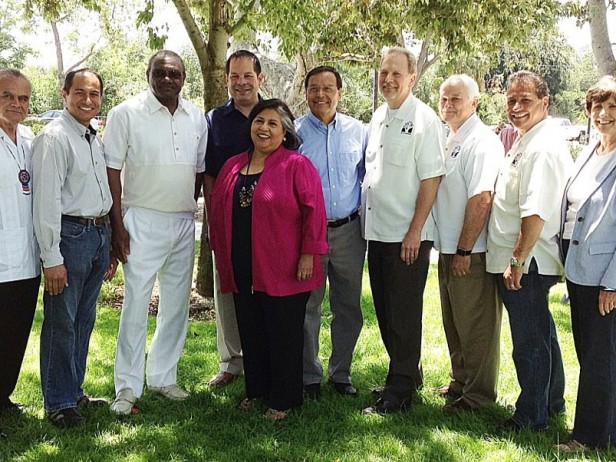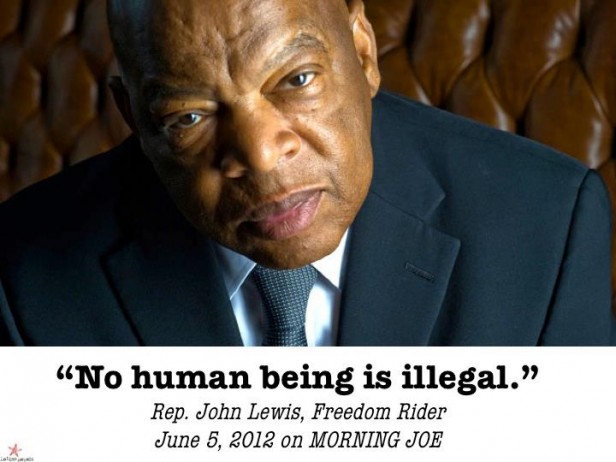JFIC Press Conf. on Deferred Action for DREAMers
INMIGRACION: Jovenes del Inland celebran anuncio de Obama
ALEJANDRO CANO/ ESPECIAL PARA LA PRENSA
Publicado: 18 junio 2012 09:18 AM
Articulos Relacionados
SAN BERNARDINO.– El anuncio al cese de deportaciones de cientos de miles de jóvenes indocumentados y la oportunidad de obtener un permiso de trabajo generó jubilo entre la comunidad inmigrante en toda la nación, la región de Inland Empire no fue la excepción.
Agradecidos con la administración del Presidente Barack Obama, alrededor de una docena de simpatizantes y lideres que abogan por los derechos de inmigrante, se congregaron en las puertas del ayuntamiento de la ciudad de San Bernardino el viernes 15 de junio por la tarde para celebrar y recordarle a la comunidad que la lucha por una reforma migratoria integral aun continua.
“Este es solo un paso en la dirección correcta. Aun nos falta mucho camino que recorrer antes de conseguir el objetivo principal, la reforma migratoria”, comentó Fernando Romero, coordinador de la Coalición Justicia para los Inmigrantes del Inland Empire. “Estamos agradecidos con el gobierno ya que esta decisión beneficiará a muchos estudiantes a conseguir el sueño americano. Los esfuerzos no han sido en vano, pero deben continuar”.
El ex profesor de la Universidad de Pitzer y actual Presidente de la Mesa Redonda Latina del Valle de Pomona, José Calderón, indicó que la decisión se originó luego de las innumerables demostraciones de repudio en contra de un sistema que ha deportado a más de 400,000 personas indocumentadas por año. Calderón añadió que Obama tomo la decisión correcta, misma que le podría ayudar a conseguir el voto Latino en las elecciones de noviembre.
“La comunidad Latina había perdido la fe en el presidente pero esta decisión lo pone más cerca de le reelección. De continuar así, no tendrá problema en conseguir el voto Latino”, dijo Calderón. “Lo ocurrido es importante y la consideramos una victoria, sin embargo, aun nos falta conseguir licencias para los indocumentados, el cese a las incautaciones de vehículos, y una forma de legalización para más de 12 millones de indocumentados”.
Para conseguir la reforma migratoria, Calderón propusó redoblar los esfuerzos para registrar al votante Latino y continuar presionando a los legisladores locales a que encaren la situación de manera responsable. Ana Laura Antúnez, de 18 años y recién graduada de la escuela preparatoria Norte Vista de Riverside, comentó que ya es momento de que los jóvenes preparatorianos se “despabilen” y salgan a las calles a demostrar su enojo con el sistema.
“No serán estudiantes de preparatoria por siempre, algún día tendrán que enfrentar el mundo real, y ese mundo real es cruel e injusto. Las leyes nos marginan y la sociedad nos discrimina porque no tenemos un documento que diga que eres legal, pues eso tiene que cambiar. Es hora de dejar el sofá y es hora de educarse, registrarse para votar y exigir los derechos”, indicó Antúnez, inmigrante indocumentada que arribó a los Estados Unidos a los tres años de edad.
Antúnez es una de las más de 800,000 mil personas indocumentadas que según las autoridades federales serán beneficiadas con el anuncio. Al igual que ella, María Rodríguez, residente de Pomona, ha esperado por años y ansiosa la tan deseada decisión.
“Un permiso de trabajo te cambia la vida, te brinda la oportunidad de contribuir con la economía. En verdad ya se había tardado el presidente”, dijo Rodríguez.
Los jóvenes tendrán que esperar un lapso de 60 días antes de comenzar cualquier trámite y aunque la decisión no encamina a la legalización, es más que bienvenida.
“Es un respiro”, concluyó Rodríguez.
Celebrating El Barrio Park’s 40th Anniversary in Claremont.
Popularidad global de Obama se desploma
 Sólo 35% de mexicanos apoya su reelección como presidente
Sólo 35% de mexicanos apoya su reelección como presidente
Jueves 14 de junio de 2012J. Jaime Hernández / Corresponsal | El Universal
WASHINGTON.— La estrella de Barack Obama en todo el mundo ha comenzado a apagarse. El entusiasmo que el entonces candidato presidencial estadounidense del Partido Demócrata arrancó en concentraciones históricas en Berlín o en El Cairo en 2008, se ha convertido hoy en mohína y desencanto.
La doctrina del unilateralismo —que prometió enterrar pero que sigue aplicando— y el avance de China como nueva potencia económica han contribuido a eclipsar su aura de estrella de rock en países como China y México, donde se registra la más acentuada caída de su popularidad, según el reporte dado a conocer ayer por el US Pew Research Center sobre tendencias de opinión internacional.
“El apoyo hacia Obama se ha desvanecido significativamente en China, donde el apoyo a sus políticas han caído un 30%, mientras que en México sus políticas se ven hoy con acritud y muy pocos tienen confianza en él”, asegura el estudio, que hace un comparativo respecto a 2009. Así, si la reelección de Obama dependiera de su popularidad en México, sus posibilidades serían nulas, ya que actualmente sólo 35% de mexicanos apoya la idea de un segundo mandato para él, mientras que 42% la rechaza.“La popularidad de Obama ha descendido en el mundo porque existe la percepción de que no escucha a sus países amigos o aliados en materia de política exterior. Y aunque en el caso de México una mayoría no apoyaría su reelección, el presidente sigue teniendo ahí mayores índices de aceptación de los que tuvo el presidente George W. Bush”, aseguró Richard Wike, uno de los principales responsables del estudio.
Para analistas como José Calderón, sociólogo y experto en las relaciones bilaterales por la Universidad de Pomona, “el hecho de que su popularidad haya descendido en países como México es muestra de la amargura que hoy se vive hacia ambos lados de la frontera por su política de deportaciones y las promesas incumplidas en el ámbito de la reforma migratoria”. Pero también eso demuestra el grado de interdependencia que ya hay entre México y Estados Unidos, donde la imagen de Obama también se ha erosionado entre la comunidad hispana”, añadió.
Irónicamente, entre los hispanos que viven en EU, 60% apoya la reelección, entre otras cosas porque le consideran como un “mal menor” frente a la opción del Partido Republicano, Mitt Romney.
En cuanto a la lucha contraterrorista, la encuesta del Pew revela que ha caído el apoyo en México en los últimos 10 años, pasando del 52% al 36%. En lo que se refiere al uso de drones o vuelos no tripulados, un 73% de los encuestados en México desaprueba su uso.
En términos generales, la aprobación de la política exterior de Obama ha bajado 15 puntos porcentuales en Europa, 19 puntos en Medio Oriente, 18 en Rusia y 30 en China, con respecto a 2009. A nivel personal, la popularidad de Obama cayó 24 puntos en China, 13 en México, 9 en Medio Oriente, 6 en Europa y un punto en Rusia. (Con información de EFE)
COPA DÍA DE ACCIÓN LEGISLATIVA -20 DE JUNIO
ÚNETE al Día de Acción Legislativa de la COPA (Miércoles, 20 de Junio de 2012): RESERVE CON CLICK AQUI
El próximo Miércoles, 20 de junio 2012, un contingente de miembros de la comunidad, organizaciones y grupos comunitarios viajarán desde Los Ángeles a Sacramento para hablar con legisladores para urgirles que apoyen la propuesta COPA / ACA 27.
La Asamblea votara para aprobar la COPA / ACA 27 este mes de Junio y una fuerte presencia de la comunidad es necesaria para apoyar la aprobación de la COPA en la asamblea.
El viaje es GRATUITO y es abierto a los miembros de la comunidad, grupos de derechos de los inmigrantes y las organizaciones comunitarias.
At Cesar Chavez Foundation
Photos from Melissa Ayala
[portfolio_slideshow id=988]
No Human Being is Illegal
The Economic Crisis Presents Contradictions and Opportunities
The nature of this economic crises is rooted in an economic structure whose primary interests are focused on profit and not on the well-being of the majority of people nationally and globally. The structure itself is held responsible for a melt-down of financial institutions and millions of workers hurled into unemployment, poverty, hunger and homelessness.
[one_half]In keeping with their defense of benefiting the top wealthy 1%, the right-wing is advancing a united front of: less regulations for corporations; letting supply and demand rule; letting the market work on its own; with no taxes (particularly at the top); with a consistent view that riches at the top will eventually trickle down to the working people; while blaming undocumented immigrants, people of color, union members, LGBT communities, poor people, and third world countries for the state of the economy.
The issue of planning in the interests of the majority is a key issue. The character of this economic system is that it has the highest level of planning in individual corporations that do everything competitively to reap the most profits. However, there is a lack of planning on a national and international level rather than a culture of collectivity dominating to use the earth’s resources to solve the many problems threatening our survival, there is a culture of greed and selfishness in the forefront.
The economic crisis is creating an opportunity for transformation. There is a need to advance a dialogue on the contradictions inherent in this economy, deepen research on the new local and global economic models that are emerging, and promote the growth of a movement based on the creation of transformative structural models of equity.
With the inability of traditional politics and politicians internationally not being able to come up with viable solutions to a growing economic crisis, there is a growing movement to advance theories and practices for a new economy
This movement is one that is based on rethinking the nature of ownership and rethinking the definition of “growth” as a basis for gauging whether there is progress..
This is an area where we can build on our common work: how to build examples of “systemic change” where the resources are used for a new type of growth that is rooted in creating a better quality of life for all. This can include worker-owned companies, cooperatives, and social enterprises that use the people’s resources for serving just and equitable community-building goals.[/one_half]
[one_half_last]This also includes the organizing of spaces of collectivity that can move from policy change within the local areas in to larger and broader change. An example is how, in the state of California, community-based coalitions have challenged the federal government’s immigration enforcement policies by organizing and passing legislation allowing undocumented students, not only to go to college, but to receive financial aid. In the city of Pomona, a coalition of pro-immigrant organizations, Pomona Habla (that includes the Latino and Latina Roundtable), changed city council policies that discriminated against undocumented immigrants and were part of a larger movement resulting in the passage of a statewide bill allowing anyone stopped at a checkpoint without a driver’s license to have someone come and pick up their car. This will kill the millions of dollars being made by the tow truck and impoundment companies. The governor, as a result of these movements, also signed a bill that called for “neither California nor any of its cities, counties, or special districts require an employer to use E-Verify as a condition of receiving a government contract, applying for or maintaining a business license, or as a penalty for violating licensing o other similar laws.” Now, these same coalitions are part of statewide coalitions that are advancing organized efforts to enact policies that will give qualified undocumented immigrants who pay state income taxes the option to enter a program whose participants will gain relief from federal enforcement and whose labor will be decriminalized.
The strength of these efforts is that they continue to build the collective capacities of our communities in advancing new directions for a more just and democratic society.[/one_half_last]
Other Publications by Dr Calderon
As a community-based participant ethnographer, Dr. Calderon has published numerous articles and studies based on his community experiences and observations.
Selected publications include:
- One Activist Intellectual’s Experience in Surviving and Transforming the Academy,” in Transforming the Ivory Tower: Critical Analyses of Sexism, Homophobia, and Racism in the Academy, edited by Mary Danico and Brett Stockdill, University of Hawaii Press, Forthcoming, Spring, 2012.
- Perspective-Taking as a Tool for Building Democratic Societies in Diversity & Democracy, Volume 14, No 1, 2010
- Review of Mexican Migration and the U. S. Economic Crisis: A Transnational Perspective, edited by Wayne A. Cornelius, David Fitzgerald, Pedro Lewin Fischer, and Leah Muse-Orlinoff in Contemporary Sociology: A Journal of Reviews, July, 2010.
- Lessons from an Activist Intellectual: Participatory Research, Teaching, and Learning for Social Change, in Latin American Perspectives, Issue 134, vol. 31, 1/04:81-94 and republished in Ethnic Studies Research: Approaches and Perspectivesby editor Timothy P. Fong, 2008
- Partnership in Teaching and Learning: Combining the Practice of Critical Pedagogy with Civic Engagement and Diversityin Diversity and Democracy: Civic Learning for Shared Futures, Vol. 11, No. 2, Spring, 2008 and republished together with another article, “Connecting Classroom Pedagogies to Community-Based Service Learning” in Diversity and Democracy: Civic Learning for Shared Futures, Vol. 11, No. 2, Spring, 2008.
- An edited book: Race, Poverty, and Social Justice: Multidisciplinary Perspectives Through Service Learning, Stylus Publishing, 2007
- An article in the edited book with Professor Gilbert Cadena, Linking Critical Democratic Pedagogy, Multiculturalism, and Service Learning to a Project-Based Approach in Race, Poverty, and Social Justice: Multidisciplinary Perspectives Through Service Learning, Stylus Publishing, 2007
- “Operation Return to Sender: A Historical Pattern of Immigration Raids,” Relay Magazine, Open Door Press, Winnipeg, Canada, July/August, 2007.
- Organizing Immigrant Workers: Action Research and Strategies in the Pomona Day Labor Center”, in Latino Los Angeles, (edited by Enrique C. Ochoa and Gilda Laura Ochoa), 2006
- “Rose M. Calderon” in Latinas in the U. S.: A Historical Encyclopedia. edited by Vickie L. Ruiz and Virginia Sanchez Korral, Bloomington: Indiana University Press, 2006.
- Syllabi and Instructional Materials for Chicano/a and Latino/a Studies in Sociology, Sixth edition (edited with Gilda Ochoa), American Sociological Association Teaching Resource Center, 2006
- Inclusion or Exclusion: One Immigrant’s Experience of Cultural and Structural Barriers to Power Sharing and Unity, in Minority Voices, edited by John Meyers, Allyn and Bacon, 2004.
- Review of Shifting Borders, Rhetoric, Immigration, and California’s Proposition 187 by Kent A. Ono and John M. Sloop in Contemporary Sociology: A Journal of Reviews, Vol. 33, No. 1, January, 2004.
- “A Break of Consciousness.” In Educational Foundations: An Anthology , edited by Roselle K. Chartock. 78 – 82 New Jersey : Prentice-Hall, Inc., 2000.
- Review of Between Two Nations: The Political Predicament of Latinos in New York City by Michael Jones –Correa in Contemporary Sociology: A Journal of Reviews, Vol. 29, No. 3, May, 2000.
- Interview by Sandra Enos. “A Multicultural and Critical Perspective on Teaching Through Community.” In Cultivating the Sociological Imagination: Concepts and Models for Service-Learning in Sociology , edited by James Ostrow, Gary Hesser, And Sandra Enos. Washington, D. C.: American Association of Higher Education American Sociological Association, 1999.
- “One Participant’s View of Cuba,” Critical Sociology, Vol. 25, #1, 1999.
- Multi-Ethnic Coalition Building in a Diverse School District, in Critical Sociology, Volume 21, No. 1, 1995
- Doing Sociology: Connecting the Classroom Experience with a Multiethnic School District, in Teaching Sociology, Volume 24, January, 1996
- “An Essay on Sources of Inter-Community Conflict and Models of Collaboration.” Journal of California Politics and Policy. Edmund G. “Pat” Brown Institute of Public Affairs, California Statue University, L. A., 1998.
- The Politics of Diversity: Immigration, Resistance, and Change in Monterey Park, California (John Horton with Jose Calderon, Mary Pardo, Leland Saito, Linda Shaw, and Yen Fen Tseng). Philadelphia: Temple University Press, 1995.
- “Multi-Ethnic Coalition Building in a Diverse School District.” Critical Sociology, 21,1 (1995): 101-111.
- “The Media As Deviant in the Rodney King Incident.” In The Image of Violence, Selected Papers, Society for the Interdisciplinary Study of Social Imagery, Edited Will Wright and Steve Kaplan. University of Southern Colorado, Fall, 1995.
- Review for October, 1993 (Vol. II, Number 1) “Notas” Newsletter of the Section On Latina and Latino Sociology of the American Sociological Association, Rebellious Lawyering: One Chicano’ Vision of Progressive Law Practice by Gerald P. Lopez, Boulder, CO: Westview Press, 1992
- “Hispanic and Latino: The Viability of Categories for Panethnic Unity.” Latin American Perspectives, June 1992.
- “Language Struggles in a Changing California Community.” Source Book on Official English, (With John Horton) edited by Jim Crawford, University of Chicago Press, 1990.
- “Latinos and Ethnic Conflict in Suburbia: The Case of Monterey Park.” Latino Studies Journal,, Vol. 1, No. 2, May, 1990.
- “How the English Only Initiative Passed in California.” Chicano Studies and the Politics of Community, Ann Arbor, MI, 1988.
- “Latinos, Ethnic Conflict, and Political Trends: the case of Monterey Park.” Chicano Studies and the Politics Community, Ann Arbor, MI, 1988.




